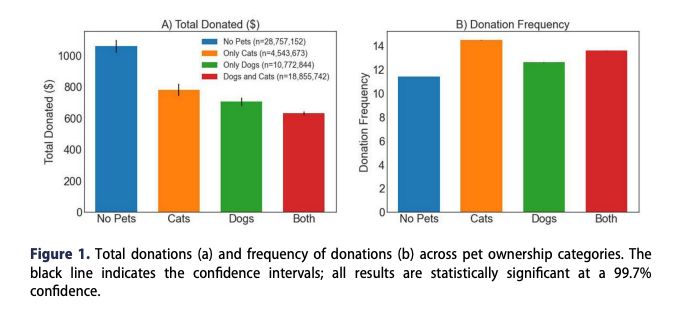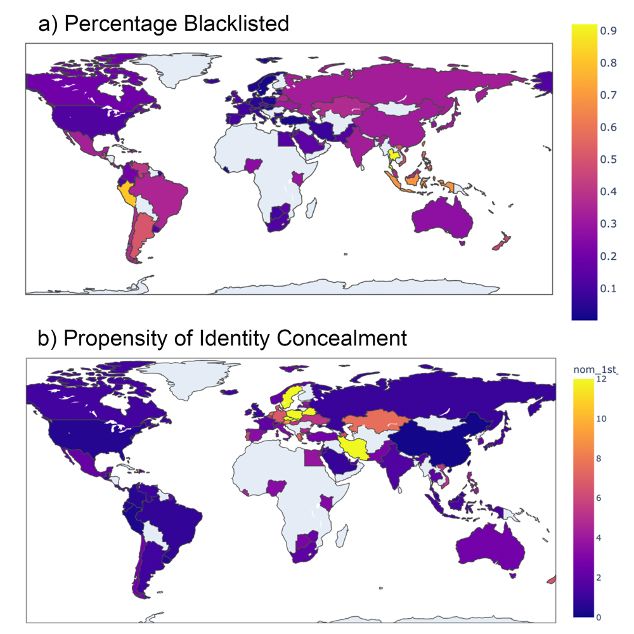
Herbert Chang 張賀鈞
@herbertchang.bsky.social
Assistant Professor of Quantitative Social Science @Dartmouth //
I study how AI & algorithms reshape human networks //
Prev. @USCAnnenberg //
I study how AI & algorithms reshape human networks //
Prev. @USCAnnenberg //
This study was powered by #CatBoost, a machine learning model whose name was too perfect to pass up 🐱
Paper also available here: www.herbert-chang.com/researchport...
Paper also available here: www.herbert-chang.com/researchport...
Preprints | Herbert Chang
www.herbert-chang.com
September 26, 2025 at 2:27 PM
This study was powered by #CatBoost, a machine learning model whose name was too perfect to pass up 🐱
Paper also available here: www.herbert-chang.com/researchport...
Paper also available here: www.herbert-chang.com/researchport...
💵 Cat owners > Dog owners in total donations.
One reason: the urban–rural divide—cats are more common in high-cost-of-living cities, where donation levels are higher overall.
One reason: the urban–rural divide—cats are more common in high-cost-of-living cities, where donation levels are higher overall.

September 26, 2025 at 2:27 PM
💵 Cat owners > Dog owners in total donations.
One reason: the urban–rural divide—cats are more common in high-cost-of-living cities, where donation levels are higher overall.
One reason: the urban–rural divide—cats are more common in high-cost-of-living cities, where donation levels are higher overall.
💵 Cat owners donate more frequently and to a wider variety of causes. This may be linked to higher psychological openness and neuroticism often associated with cat people.

September 26, 2025 at 2:27 PM
💵 Cat owners donate more frequently and to a wider variety of causes. This may be linked to higher psychological openness and neuroticism often associated with cat people.
💵 Non-pet owners give the most money overall—but they give less frequently and to fewer causes.

September 26, 2025 at 2:27 PM
💵 Non-pet owners give the most money overall—but they give less frequently and to fewer causes.
Grateful for my co-authors (and mentors as this was a dissertation chapter) James Druckman, @emilioferrara.bsky.social, and @robbwiller.bsky.social
#SocialMedia #Politics #ComputationalSocialScience #PNASNexus #RetweetAsymmetry
#SocialMedia #Politics #ComputationalSocialScience #PNASNexus #RetweetAsymmetry
August 8, 2025 at 3:37 PM
Grateful for my co-authors (and mentors as this was a dissertation chapter) James Druckman, @emilioferrara.bsky.social, and @robbwiller.bsky.social
#SocialMedia #Politics #ComputationalSocialScience #PNASNexus #RetweetAsymmetry
#SocialMedia #Politics #ComputationalSocialScience #PNASNexus #RetweetAsymmetry
3/ Our analysis shows that
🔹 Liberals = more diverse, more toxic info environments
🔹 Conservatives = more filtered, less cross-cutting exposure
These results show that blanket, one-size-fits-all content moderation could have unintended ideological effects.
🔹 Liberals = more diverse, more toxic info environments
🔹 Conservatives = more filtered, less cross-cutting exposure
These results show that blanket, one-size-fits-all content moderation could have unintended ideological effects.
August 8, 2025 at 3:37 PM
3/ Our analysis shows that
🔹 Liberals = more diverse, more toxic info environments
🔹 Conservatives = more filtered, less cross-cutting exposure
These results show that blanket, one-size-fits-all content moderation could have unintended ideological effects.
🔹 Liberals = more diverse, more toxic info environments
🔹 Conservatives = more filtered, less cross-cutting exposure
These results show that blanket, one-size-fits-all content moderation could have unintended ideological effects.
2/ Liberals also amplify toxic tweets—especially when Democrats criticize Republicans. However, when Conservatives avoid toxic content, when sourced from Democrats.


August 8, 2025 at 3:37 PM
2/ Liberals also amplify toxic tweets—especially when Democrats criticize Republicans. However, when Conservatives avoid toxic content, when sourced from Democrats.
1/ Liberals retweet both Democrat and Republican lawmakers—across many issues.
Conservatives, by contrast, mostly share Republican-owned content.
Conservatives, by contrast, mostly share Republican-owned content.


August 8, 2025 at 3:37 PM
1/ Liberals retweet both Democrat and Republican lawmakers—across many issues.
Conservatives, by contrast, mostly share Republican-owned content.
Conservatives, by contrast, mostly share Republican-owned content.
Special shout out to my two brilliant collaborators @ebharrington.bsky.social and Dan Rockmore.
July 17, 2025 at 2:35 PM
Special shout out to my two brilliant collaborators @ebharrington.bsky.social and Dan Rockmore.
Huh? Yes: elites in well-governed countries (Scandinavia, Singapore, etc.) also offshore wealth.
Why? To dodge high taxes, strict enforcement, or just to stay under the radar.
Secrecy is essentially a tool for both fear of authoritarianism and transparency.
Why? To dodge high taxes, strict enforcement, or just to stay under the radar.
Secrecy is essentially a tool for both fear of authoritarianism and transparency.
July 17, 2025 at 2:35 PM
Huh? Yes: elites in well-governed countries (Scandinavia, Singapore, etc.) also offshore wealth.
Why? To dodge high taxes, strict enforcement, or just to stay under the radar.
Secrecy is essentially a tool for both fear of authoritarianism and transparency.
Why? To dodge high taxes, strict enforcement, or just to stay under the radar.
Secrecy is essentially a tool for both fear of authoritarianism and transparency.
Some highlights from the data. Corrupt countries or where asset confiscation is likely, elites use diversification.
And paradoxically: strong democracies = some form of identity concealment.
And paradoxically: strong democracies = some form of identity concealment.

July 17, 2025 at 2:35 PM
Some highlights from the data. Corrupt countries or where asset confiscation is likely, elites use diversification.
And paradoxically: strong democracies = some form of identity concealment.
And paradoxically: strong democracies = some form of identity concealment.
Elites don’t just stash money in tax havens—they strategically choose how and where to hide it.
We find three main “secrecy strategies”:
1. Diversify assets across jurisdictions
2. Conceal identity (nominees, bearer shares)
3. Use blacklisted havens despite stigma
We find three main “secrecy strategies”:
1. Diversify assets across jurisdictions
2. Conceal identity (nominees, bearer shares)
3. Use blacklisted havens despite stigma

July 17, 2025 at 2:35 PM
Elites don’t just stash money in tax havens—they strategically choose how and where to hide it.
We find three main “secrecy strategies”:
1. Diversify assets across jurisdictions
2. Conceal identity (nominees, bearer shares)
3. Use blacklisted havens despite stigma
We find three main “secrecy strategies”:
1. Diversify assets across jurisdictions
2. Conceal identity (nominees, bearer shares)
3. Use blacklisted havens despite stigma
We analyzed 6.9TB of leaked offshore data (Panama, Paradise, Pandora Papers) from the @icij.org and combined that with established Rule of Law indices from the World Justice Project.
July 17, 2025 at 2:35 PM
We analyzed 6.9TB of leaked offshore data (Panama, Paradise, Pandora Papers) from the @icij.org and combined that with established Rule of Law indices from the World Justice Project.

